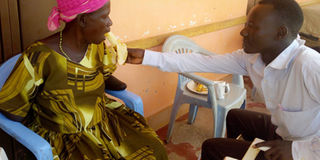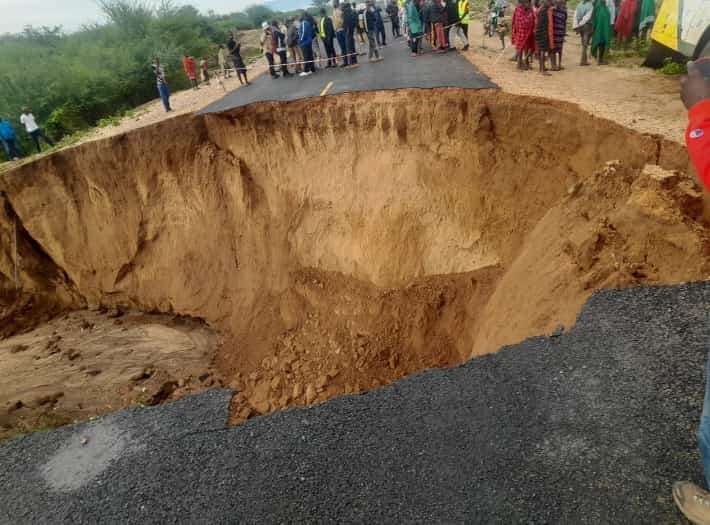Domestic violence cases increasing in Lango region

Victim. Ms Paskolina Oming, a victim of domestic violence, is fed by her son Ivan Okello at Aryebi Village, Omolo Parish, Iceme Sub-county in Oyam District on September 16. PHOTO BY BILL OKETCH
What you need to know:
- Issue. Leaders say domestic violence cases increase during harvesting period.
- In his judgment, the then Lira Chief Magistrate Alex Mushabe Karocho, stated that the convict’s acts were barbaric and inhumane.
Paskolina Oming was returning from the market in 2014 when she turned and saw her nephew, Jasper Okech, running towards her with a panga (machete).
Okech later cut his paternal aunt with the machete in the presence of four other women who were walking with Ms Oming that fateful day
The two had been involved in a domestic brawl over two acres of land that the woman’s late husband left behind for her and their six children.
Okech first cut the 60-year-old widow on the forehead, and as she struggled to protect the head, he chopped off both her arms.
The incident happened near the victim’s Aryebi home village, Omolo Parish, Iceme Sub-county in Oyam District on April 25, 2014.
The matter was reported to police leading to Okech’s arrest before he ended up in the courts of law.
In his judgment, the then Lira Chief Magistrate Alex Mushabe Karocho, stated that the convict’s acts were barbaric and inhumane.
“If there is any situation where a clear signal should be sent out as a warning for citizens never to take the law into their own hand then this is the most applicable circumstance. The convict is sentenced and shall serve 15 years imprisonment,” Mr Mushabe ruled on July 9, 2018.
While the convict is serving his jail term at Lira Central Prison, the victim has been reduced to helplessness.
Ms Oming says everything she could have done by herself, is now being done by close relatives.
“Some organisation gave me artificial limbs but I have stopped using it because I feel some pain whenever I put it on. The children are now suffering because there is no way I can support them because of my current condition,” Ms Oming says.
Just like Ms Oming, many women in northern Uganda have led very challenging lives.
Violence and injustice have become a part of life for people in Lango, according to Gender, Violence, and Peacebuilding in Northern Uganda report written by Emily Manaen in March 2011.
Ms Lillian Mercy Apio, the Women of Uganda Network’s team leader in Lango, says domestic violence is associated with ignorance, poverty and the struggle for land – the only asset left after the Lord’s Resistance Army (LRA) insurgency.
Police says domestic violence cases in Lango sub-region increase during harvesting period as couples fight over money generated from the selling crops.
Kole community liaison officer, Mr Julius Martin Ongu, said: “The rate of domestic violence is very high because people have now started selling soya beans, and on average we receive five cases of domestic violence.”
He added that they are carrying out community policing so as to mitigate the rate of domestic violence in the area.
Economic imbalance
Action Against Violence, a community-based organisation working in Kole District, has registered 48 cases of domestic violence from June to end of September in Bala Sub-county alone.
Mr Caesar Alaju, the executive director of Action Against Violence, blames the rising cases of domestic violence on economic imbalance.
“When it is planting season, a man and a woman go to the field for cultivation. From planting, weeding and harvesting everything is done together, but when it comes to marketing the produce, the man takes control,” he explains.
However, he says, men use the money generated from selling produce to indulge in irresponsible drinking, forgetting the core family responsibility such as paying school fees. He adds that when a woman complains the battle begins.
Mr Alaju says the community development office at the sub-county level that is mandated by the law to conduct awareness on the dangers of domestic violence is almost non-functional because of under-funding.
“Like the community development department, Mr Alaju says, civil society organisations lack adequate funding to support the victims of domestic violence to access justice.
“There is nothing much we can do without adequate financial support, and so, the victims of domestic violence suffer while the perpetrators remain at large,” he adds.
Residents complain
Members of the community claim when you report a case to police, law enforcers ask you to give them with Shs20,000 for fuel to go and effect the arrest.
“Where do you expect a poor woman who has been battered by her husband, to get all that money from?” Ms Molly Okello, a resident of Apii Village, Ayer Sub-county in Kole District, asks.
The Uganda Joint Christian Council, Lira District administration and Lango Cultural Foundation last year pledged their commitment to curb domestic violence in Lira.
In a joint communiqué issued at Modern Primary School, Adyel Division in Lira Municipality, the parties said they would work with various leaders and stakeholders to end all forms of violence against women and girls.



